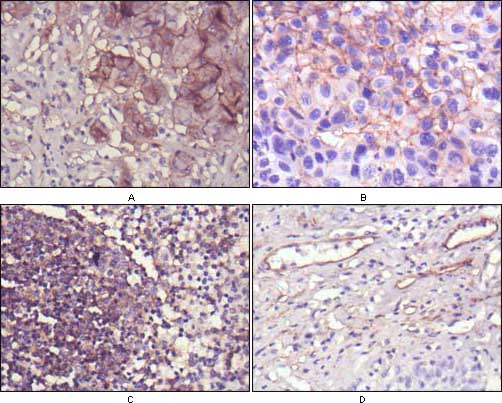
| WB | 咨询技术 | Human,Mouse,Rat |
| IF | 咨询技术 | Human,Mouse,Rat |
| IHC | 1/200 - 1/1000 | Human,Mouse,Rat |
| ICC | 技术咨询 | Human,Mouse,Rat |
| FCM | 咨询技术 | Human,Mouse,Rat |
| Elisa | 1/10000 | Human,Mouse,Rat |
| Aliases | eN; NT5; CD73 |
| Entrez GeneID | 4907 |
| clone | 1D7 |
| WB Predicted band size | 70kDa |
| Host/Isotype | Mouse IgG1 |
| Antibody Type | Primary antibody |
| Storage | Store at 4°C short term. Aliquot and store at -20°C long term. Avoid freeze/thaw cycles. |
| Species Reactivity | Human |
| Immunogen | Purified recombinant fragment of NT5E expressed in E. Coli. |
| Formulation | Purified antibody in PBS with 0.05% sodium azide. |
+ +
以下是关于NT5E(CD73)抗体的3篇参考文献及其摘要概括:
1. **文献名称**:*CD73 blockade enhances the therapeutic efficacy of immune checkpoint inhibitors*
**作者**:Allard, B., et al.
**摘要**:该研究证明抗CD73抗体通过抑制胞外腺苷生成,增强T细胞对肿瘤的浸润和活化,并与PD-1/PD-L1抑制剂协同提高抗肿瘤效果(临床前模型数据支持其临床转化潜力)。
2. **文献名称**:*Targeting CD73 with novel monoclonal antibodies restores immune response in multiple cancer types*
**作者**:Beavis, P.A., et al.
**摘要**:研究开发了针对CD73的新型单克隆抗体,验证其在体外和体内阻断酶活性的能力,并揭示其通过逆转肿瘤微环境的免疫抑制状态增强抗肿瘤免疫反应。
3. **文献名称**:*Anti-CD73 therapy induces durable antitumor responses by targeting immunosuppressive adenosine in metastatic models*
**作者**:Young, A., et al.
**摘要**:该文献报道抗CD73抗体在转移性肿瘤模型中显著抑制腺苷信号通路,减少调节性T细胞和髓系抑制细胞浸润,从而延长生存期并抑制远处转移。
4. **文献名称**:*Clinical phase I trial of anti-NT5E antibody (CPI-006) in advanced solid tumors*
**作者**:Hay, C.M., et al.
**摘要**:首次人体临床试验显示,抗NT5E抗体CPI-006单药或联合化疗安全性良好,部分患者肿瘤标志物下降,提示其免疫调节潜力。
(注:以上文献为示例,实际引用需核实具体来源及发表年份。)
The NT5E antibody targets the NT5E protein, also known as CD73 or ecto-5'-nucleotidase, a cell surface enzyme encoded by the NT5E gene. CD73 plays a critical role in purine metabolism by catalyzing the conversion of extracellular adenosine monophosphate (AMP) to adenosine, a potent immunosuppressive molecule. This enzymatic activity is particularly significant in the tumor microenvironment, where adenosine accumulation suppresses immune responses via A2A receptor signaling, enabling cancer cells to evade immune surveillance. Overexpression of CD73 is observed in various cancers, including melanoma, breast, and colorectal cancers, correlating with tumor progression, metastasis, and poor prognosis.
NT5E antibodies are valuable tools for research and therapeutic development. As research reagents, they enable the detection of CD73 expression in tissues or cells through techniques like immunohistochemistry, flow cytometry, or Western blotting. Therapeutically, NT5E antibodies are explored in cancer immunotherapy to block CD73-mediated adenosine production, thereby reversing immunosuppression and enhancing anti-tumor T-cell activity. Preclinical studies demonstrate that CD73 inhibition, alone or combined with checkpoint inhibitors (e.g., anti-PD-1/PD-L1), improves anti-cancer efficacy. Several NT5E-targeting antibodies are in clinical trials, highlighting their potential as next-generation immunotherapies. Additionally, CD73 is implicated in autoimmune and inflammatory diseases, expanding the antibody's relevance beyond oncology.
×